
Can Autistic People Work?
Unlocking Employment Opportunities for Autistic Adults
Understanding Autism and Employment
Autism Spectrum Disorder (ASD) is a neurological developmental condition affecting approximately 1-2% of the global population. Despite many autistic individuals possessing normal or high-normal IQs and no significant disabilities, their employment rates remain notably low worldwide. This disparity highlights the challenges and opportunities in integrating autistic adults into the workforce, emphasizing the importance of support, understanding, and inclusive practices.
The Capabilities and Challenges of Autistic Individuals in the Workforce
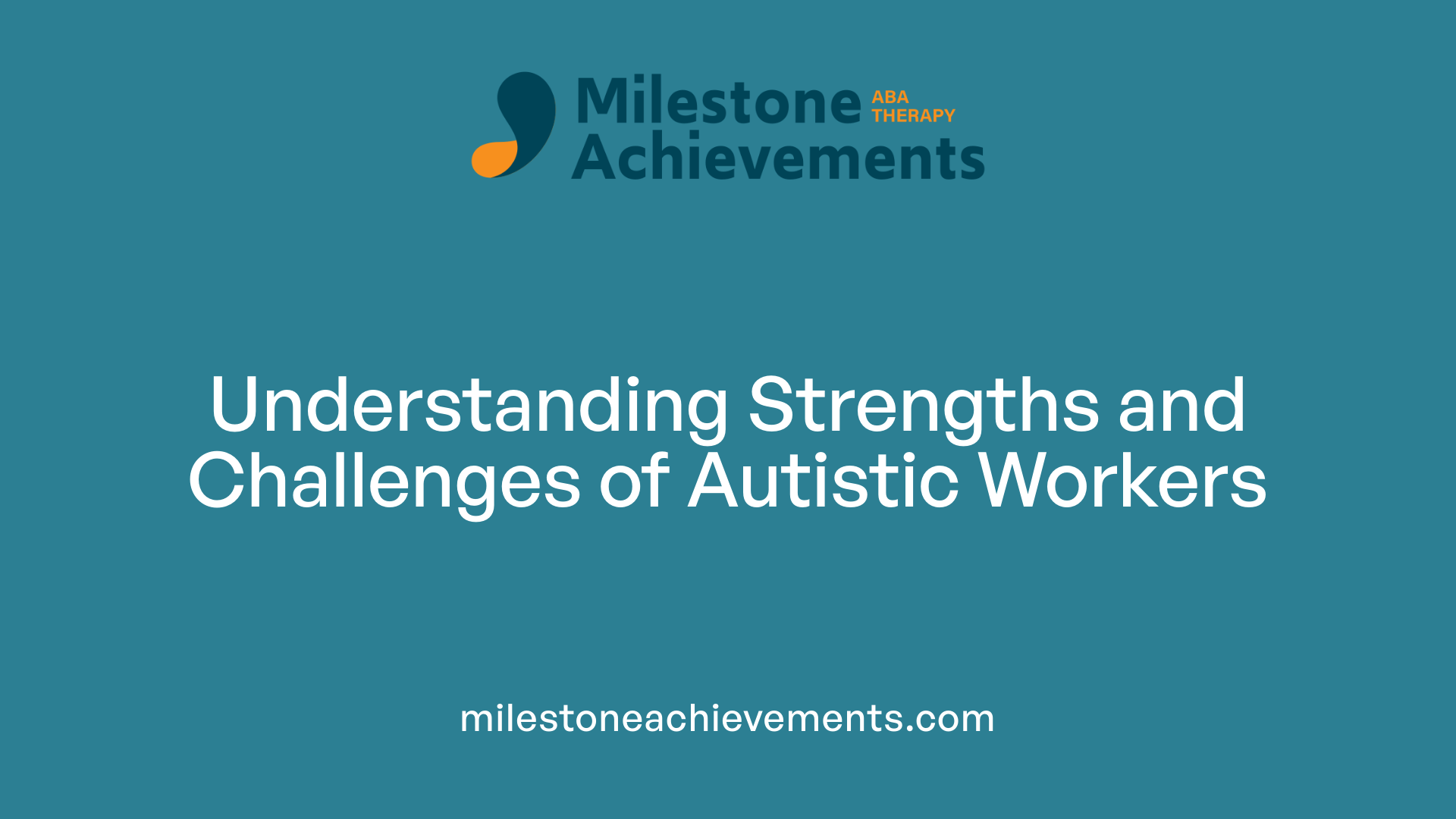
Are autistic individuals capable of working and what challenges might they face in employment?
Autistic individuals are fully capable of working and often bring unique strengths to the workplace, such as creativity, attention to detail, reliability, and high levels of focus. However, despite these abilities, their employment rates are notably low worldwide. For example, in Europe during 2014, between 76% and 90% of autistic people were unemployed. Similarly, in the US in 2023, approximately 85% of autistic adults were unemployed, with only about 15% engaged in full-time paid employment.
Many autistic adults encounter barriers that hinder their integration into the workforce. Common issues include difficulties with social communication, interpreting social cues, and managing sensory sensitivities like sensitivity to light or sounds. These challenges often make it hard to navigate workplace interactions, understand unwritten social rules, or cope with unpredictable environments.
Executive functioning difficulties, such as planning, time management, and decision-making, can impact job performance. Additionally, heightened anxiety—especially during interviews or new situations—can hinder their ability to secure employment.
Further complicating matters, societal stigma and discrimination lead to fewer opportunities and sometimes outright hostility in workplaces. Many autistic individuals report experiences of harassment or lack of support. In some cases, sensory hypersensitivities or health issues like allergies also interfere with regular work routines.
Despite these hurdles, research highlights the importance of supportive measures. Accommodations such as quiet workspaces, clear instructions, flexible hours, and understanding management can significantly improve employment outcomes. Studies suggest that those with higher social and conversational skills tend to have better job prospects.
Increasingly, organizations recognize the value of neurodiversity and promote inclusive employment practices. Strategies like targeted training, job coaching, and inclusive policies are essential for leveraging the talents of autistic workers. With the right support, many autistic individuals are able to succeed in various sectors—including IT, healthcare, creative industries, and more—challenging stereotypes and demonstrating their potential.
In summary, autistic people are capable of productive, meaningful work. Overcoming employment barriers involves understanding their unique needs, providing proper accommodations, and fostering inclusive environments. Doing so not only benefits autistic employees but enriches workplaces with diverse perspectives and skills.
Employment Support Strategies, Resources, and Programs for Autistic Adults
There are numerous employment support strategies, resources, and programs designed to help autistic individuals find and maintain meaningful employment. These efforts include federal initiatives like the Workforce Innovation & Opportunity Act (WIOA), which provides employment services and vocational training tailored to disabled job seekers, including those on the autism spectrum.
Specialized programs such as Autism@Work, Hire Autism, and supported employment models offered by organizations like the Canadian Autism Foundation (CAF) focus on job placement and ongoing support. These programs often include skills training, workplace assessments, and personalized coaching, helping autistic employees thrive in their roles.
Government agencies play a vital role by providing accommodations and transitional services. The Department of Labor’s Office of Disability Employment Policy (ODEP) and state vocational rehabilitation (VR) services facilitate workplace adjustments, career counseling, and tailored training programs to support community employment.
Nonprofit organizations such as the Autism Society and the Autistic Self Advocacy Network (ASAN) actively connect individuals with employers, promote inclusive hiring practices, and advocate for workplace policies that recognize the strengths and needs of autistic employees.
Resources available to autistic job seekers also include online platforms like TheSpectrumCareers, where individuals can connect with autism-friendly employers. Educational resources and toolkits, such as those provided by Autism Speaks, guide job seekers on resume writing, interview preparation, and requesting workplace accommodations.
In summary, these combined efforts—ranging from government programs to community-based support—aim to improve employment outcomes, foster workplace inclusion, and empower autistic adults to succeed professionally.
| Support Type | Providers/Programs | Focus Areas | Additional Details |
|---|---|---|---|
| Federal Employment Legislation | WIOA, Ticket to Work, EARN | Job training, employment services, accommodations | Support for disabled individuals including autism spectrum |
| Specialized Programs | Autism@Work, Hire Autism, CAF-supported models | Job placement, skills training, ongoing coaching | Tailored service models and employer engagement |
| Government Agencies | ODEP, VR Services | Workplace adjustments, transitional employment | Facilitate community employment and workplace inclusion |
| Advocacy and Support Organizations | Autism Society, ASAN | Employer connection, policy advocacy | Promote inclusive hiring and workplace policies |
| Resources and Platforms | TheSpectrumCareers, Autism Speaks | Job matching, resume building, interview prep | Online resources and guides for autistic job seekers |
Exploring these options and utilizing available resources can significantly improve employment prospects for autistic adults, fostering independence and enhancing workplace diversity.
Practical Tips for Autistic Job Seekers and Employees
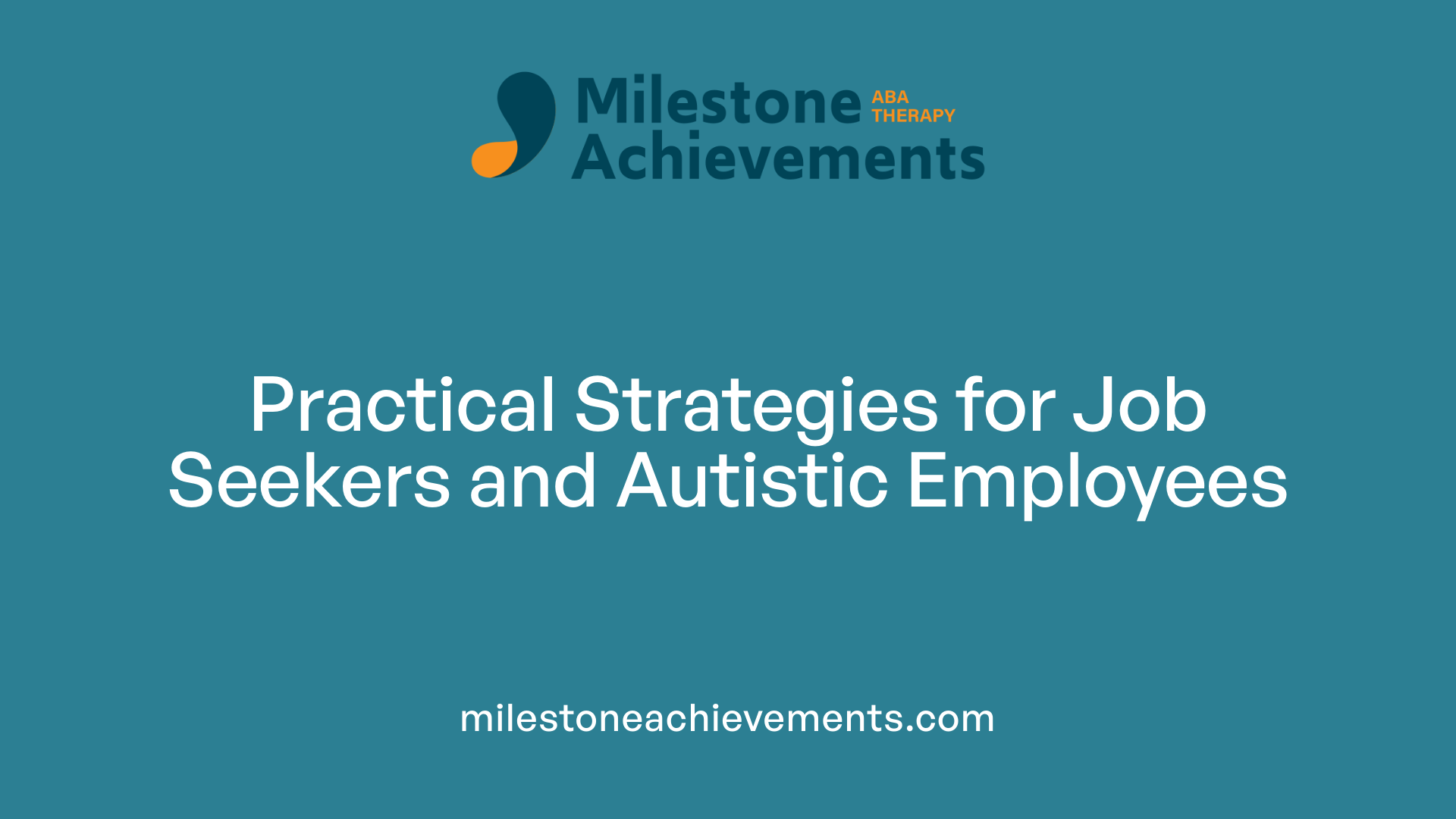
What are some effective tips for autistic individuals in finding, securing, and maintaining employment?
Autistic individuals can significantly improve their chances of employment and workplace success by focusing on their unique strengths and preferences. Recognizing talents such as attention to detail, creativity, honesty, and reliability helps in selecting roles suited to one's skills, like data entry, web development, or healthcare support.
When searching for jobs, it is beneficial to target companies known for inclusive practices. Resources like Autism Speaks’ free online modules and job portals such as TheSpectrumCareers offer valuable support and connection opportunities. Building a network through social media, community groups, or vocational programs can open doors to tailored opportunities.
Requesting workplace accommodations is crucial. These may include quiet workspaces, visual aids, flexible schedules, or modified interview processes. Such adjustments can help manage sensory sensitivities and reduce anxiety, creating a more productive environment.
Effective communication is another vital component. Practicing social skills, using clear and concise language, and employing tools like email or visual plans can facilitate better interactions with colleagues and managers. For some, developing a personal “social script” can ease workplace conversations.
Maintaining a structured routine helps manage time and reduce stress. Using calendars, checklists, or organizational apps supports punctuality and task completion, preventing burnout. Setting personal boundaries ensures work-life balance and mental well-being.
Finally, leveraging support networks and resources enhances employment prospects. Initiatives such as supported internships, mentorship programs, and government employment services provide tailored guidance. Organizations like the Autism Society, Autism Speaks, and local vocational rehabilitation services are valuable allies.
Overall, success in employment for autistic individuals hinges on recognizing strengths, utilizing available supports, and fostering an inclusive, understanding work environment.
Autism’s Impact on Work Life: Strengths and Workplace Considerations
How do autism's characteristics impact work life, and what are some strengths and workplace considerations?
Autism’s traits can influence work experiences in both positive and challenging ways. Many autistic individuals bring unique cognitive strengths, including exceptional creativity, focus, and memory, which can translate into higher accuracy, efficiency, and a systematic approach to tasks. These qualities often make them particularly suited to jobs that require attention to detail and structured workflows.
Personal attributes such as honesty, dedication, and reliability also stand out, fostering trust within teams and helping create inclusive, supportive workplace environments. For example, their systematic thinking and ability to recognize patterns can benefit roles in IT, data analysis, or quality control.
On the other hand, social interactions and routine changes can pose hurdles. Difficulties in interpreting social cues or managing sensory sensitivities may affect communication and workplace comfort. This can lead to misunderstandings or stress, complicating integration into traditional work settings.
Addressing these challenges involves implementing accommodations such as quiet work areas, visual supports, flexible scheduling, and clear instructions. Such adjustments enable autistic employees to perform at their best and thrive.
By recognizing and leveraging these strengths through tailored job roles and supporting policies, employers can foster employment environments where autistic individuals succeed. Promoting awareness, providing training, and encouraging systemic inclusion are essential steps towards harnessing the unique talents of autistic workers, ultimately benefitting both individuals and organizations.
Autism-Friendly Careers and Inclusive Hiring Practices
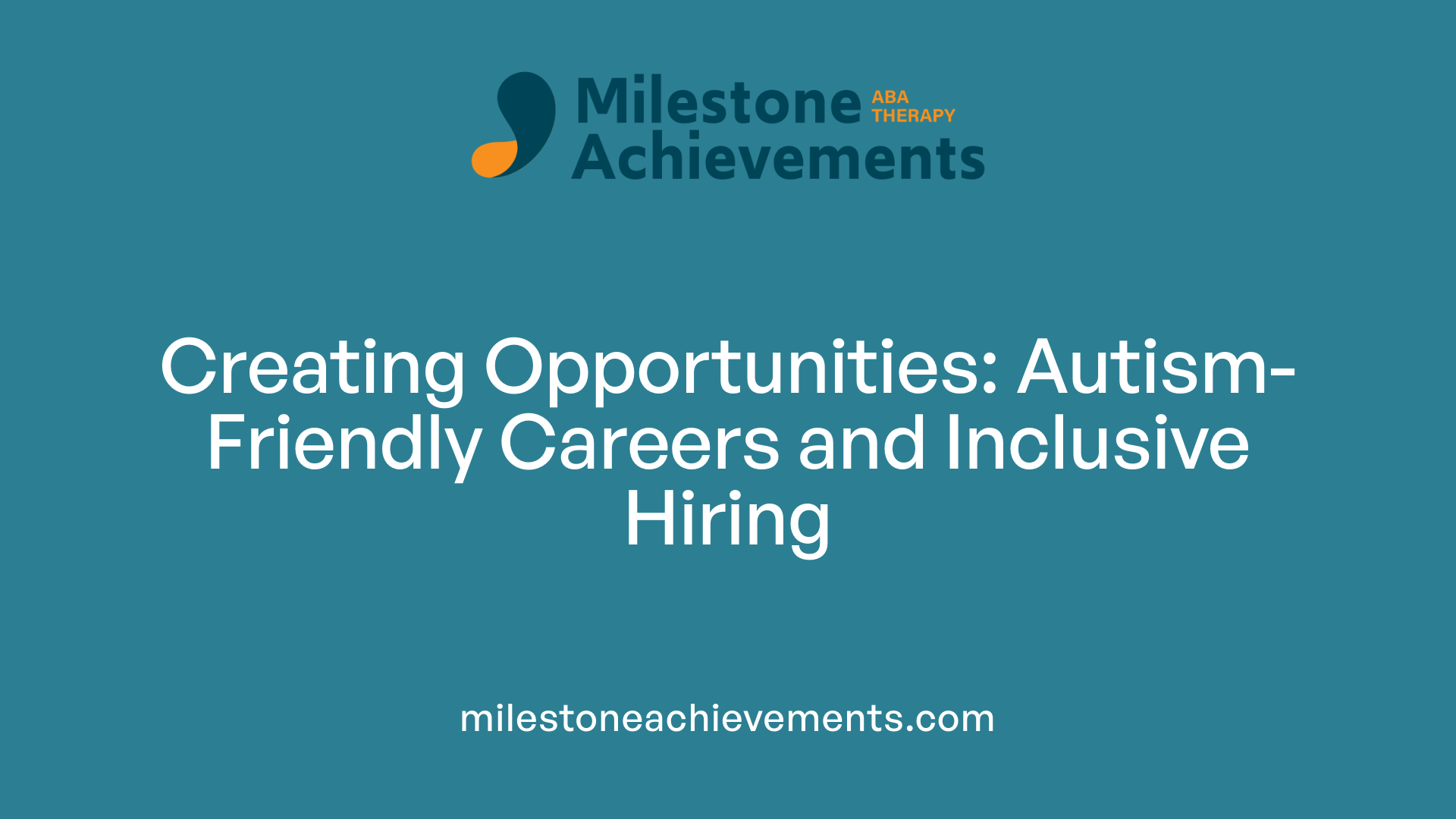
What are some autism-friendly jobs and inclusive hiring practices?
Autism-friendly careers often include roles that leverage strengths like attention to detail, logical reasoning, and pattern recognition. Popular jobs suitable for autistic individuals include web development, data analysis, finance, engineering, quality control, and research. These positions typically involve structured tasks, minimal social interaction, and clear guidelines, making them well-suited for many on the autism spectrum.
Employers aiming to create inclusive workplaces should adopt specific practices to support autistic employees. This includes establishing transparent and structured recruitment processes, such as providing advance notice of interview questions and offering sensory-friendly environments—like quiet rooms and adjustable lighting—to reduce discomfort.
Flexible work arrangements also promote success, enabling employees to work during their most productive hours and offering options such as remote work or flexible schedules. Clear communication, visual aids, and agreed-upon routines foster a supportive atmosphere.
Programs like Autism Speaks' Workplace Inclusion Now (WIN) and resources from the Job Accommodation Network (JAN) offer tools, training, and strategies to help organizations foster autism-friendly environments. These initiatives encourage awareness, understanding, and practical adjustments that benefit both autistic employees and the organization.
Creating workplaces that accommodate neurodiversity not only supports individual success but also enhances overall organizational innovation, productivity, and social inclusion.
Supporting Autistic Employees: Resources for Employers and Support Services
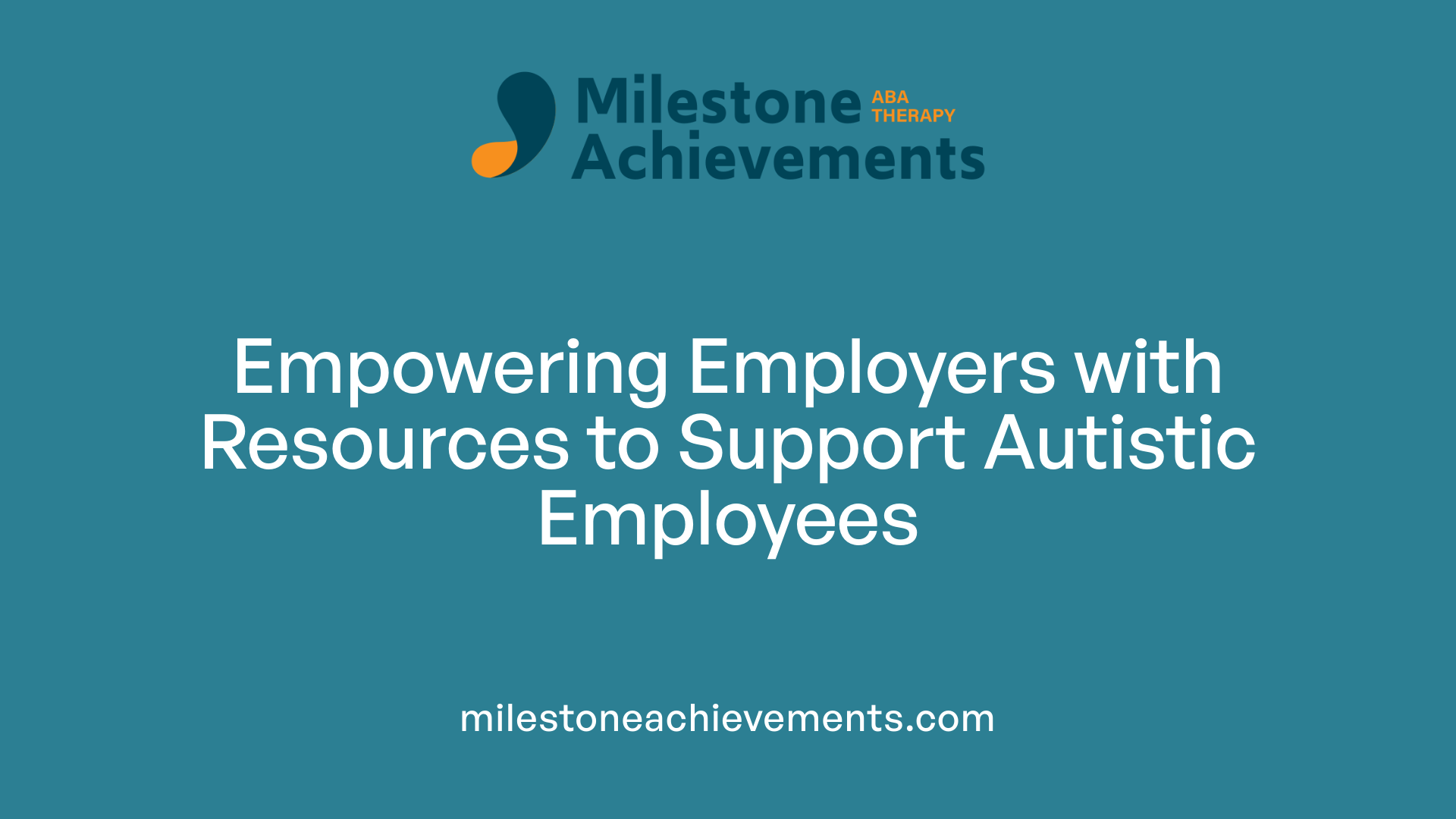
What resources and information are available for employers and support services to assist autistic employees?
Employers looking to support autistic employees have access to a variety of valuable resources designed to promote inclusive workplace practices. Organizations like the Job Accommodation Network (JAN), Autism Speaks, and EARN offer comprehensive toolkits, guidance documents, and training modules that focus on implementing workplace accommodations and fostering an inclusive environment.
These resources provide practical strategies such as offering clear instructions, visual supports, and mentorship programs tailored to neurodiverse needs. They also include templates and checklists for requesting reasonable adjustments, making the process straightforward for both employers and employees.
Furthermore, federal agencies and nonprofit organizations publish frameworks and reports to drive best practices. For example, the Autism @ Work Playbook provides a structured approach for integrating autistic talent into the workforce effectively. Support programs like the Microsoft Neurodiversity Career Connector or Autism Empowerment Kit offer targeted initiatives to help organizations identify suitable candidates and develop support networks.
By utilizing these resources, companies can create accessible, accommodating, and welcoming workplaces. Such efforts not only improve employment outcomes for autistic individuals but also enrich the overall organizational culture by embracing diversity and unique perspectives.
Workplace Success Stories and the Path Forward
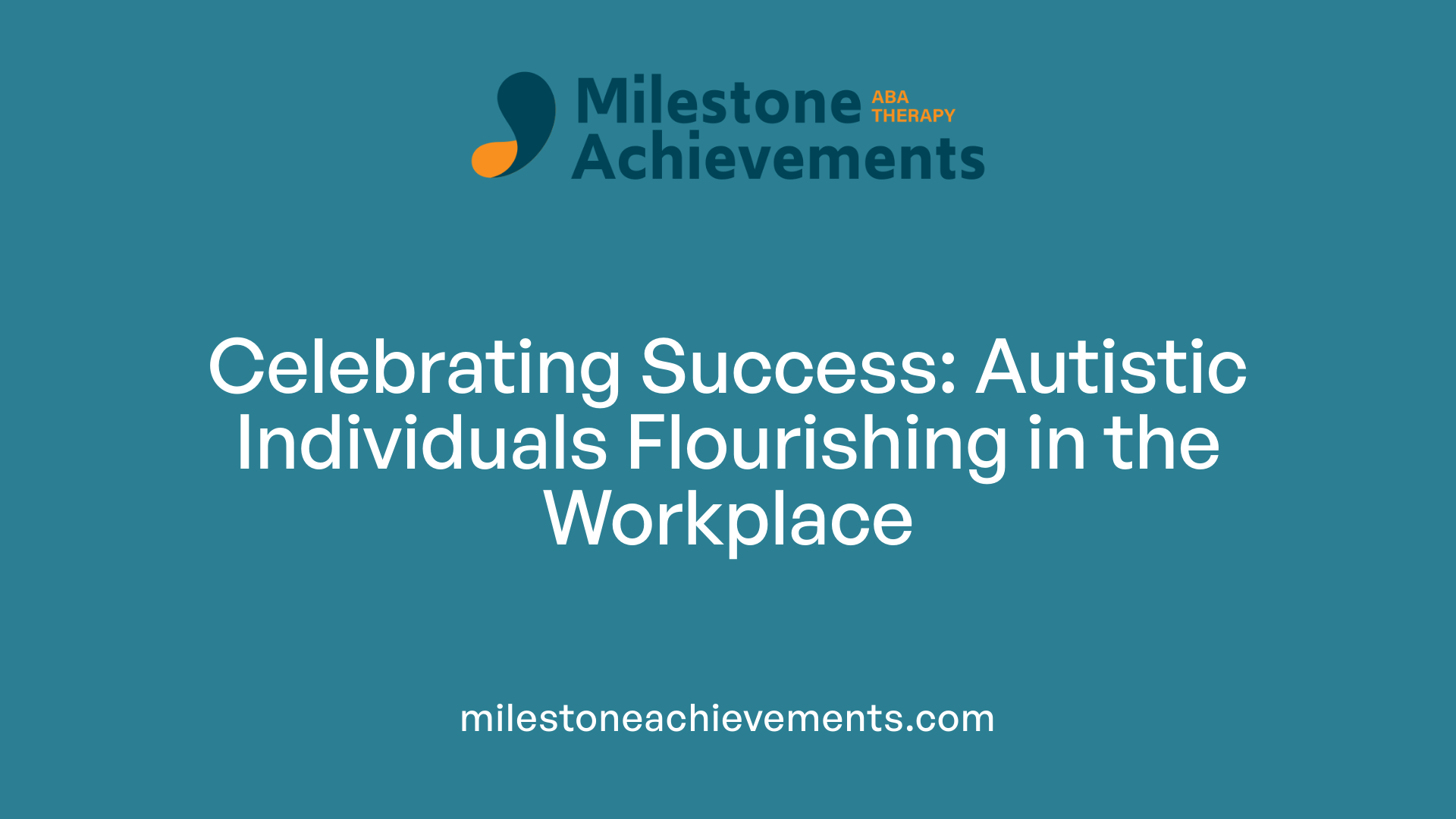
What are some success stories of autistic individuals in employment, and how do they inform future efforts?
Personal stories of autistic workers, such as Lee, an autistic Fire Safety Inspector, showcase how workplaces can foster success by accommodating the unique needs and strengths of autistic employees. Lee’s journey exemplifies how targeted support, including sensory accommodations and flexible scheduling, empowers autistic individuals to excel in their roles. These stories not only highlight individual achievement but also serve as powerful examples for other employers to adopt inclusive practices.
Success narratives emphasize the importance of creating environments that respect neurodiversity. Implementing practices like comprehensive onboarding, ongoing training, and visual aids can help autistic employees navigate social and sensory challenges. Recognizing and valuing specific talents—such as attention to detail, reliability, and systematic work—can lead to innovative and productive teams.
The positive outcomes from these success stories inspire companies to invest in inclusive policies and promote awareness about autism. Moving forward, efforts should focus on fostering workplaces that prioritize diversity and adaptability. This includes providing continuous education for staff, offering reasonable adjustments, and cultivating a culture of understanding and support.
By embracing neurodiversity, organizations can benefit from increased creativity, loyalty, and problem-solving abilities of autistic employees. Ultimately, these stories demonstrate that with the right support, autistic individuals can thrive professionally, paving the way for more inclusive and dynamic work environments.
For more inspiration and real-world examples, searching terms like "autistic employment success stories" can reveal numerous case studies and personal accounts, encouraging wider adoption of inclusive employment practices.
Building a More Inclusive Workforce
Increasing awareness, targeted support, and inclusive hiring practices are vital for integrating autistic adults into meaningful employment. Recognizing their strengths and addressing barriers can unlock their potential and enrich the workforce. Employers, policymakers, and communities must work together to create accessible, supportive environments where autistic individuals can thrive professionally, contributing valuable skills, perspectives, and diversity to today’s economy.
References
- Employment of autistic people - Wikipedia
- Autism - U.S. Department of Labor
- 10 things that make it hard for autistic people to get employment
- Employment - National Autistic Society
- The Strengths and Abilities of Autistic People in the Workplace - PMC
- Tips for autistic job seekers to find the right job | Autism Speaks
- Autism and Employment - Child Mind Institute


Partner with us on your child's journey
Milestone Achievements offers evidence-based ABA therapy to help children with autism reach their full potential. Together we’ll set meaningful goals and celebrate progress every step of the way.
Start ABA Services Today





